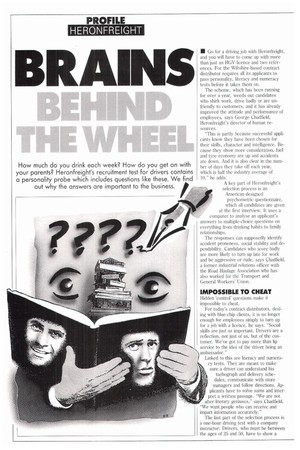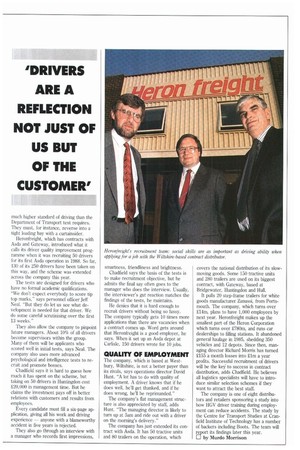BR
Page 44

Page 45

If you've noticed an error in this article please click here to report it so we can fix it.
• Go for a driving job with Heronfreight, and you will have to come up with more than just an HGV licence and two references. For the Wiltshire-based contract distributor requires all its applicants to pass personality, literacy and numeracy tests before it takes them on.
The scheme, which has been running for over a year, weeds out candidates who shirk work, drive badly or are unfriendly to customers, and it has already improved the attitude and performance of employees, says George Chadfield, Heronfreight's director of human resources.
"This is partly because successful applicants know they have been chosen for their skills, character and intelligence. Because they show more consideration, fuel and tyre economy are up and accidents are down. And it is also clear in the number of days they take off each year. which is half the industry average of 10," he adds.
A key part of Heronfreight's selection process is an American-designed psychometric questionnaire, which all candidates are given at the first interview. It uses a computer to analyse an applicant's answers to multiple-choice questions on everything from drinking habits to family relationships.
The responses can supposedly identify accident proneness, social stability and dependability. Candidates who score badly are more likely to turn up late for work and be aggressive or rude, says Chadfield, a former industrial relations officer with the Road Haulage Association who has also worked for the Transport and General Workers' Union.
Hidden 'control' questions make it impossible to cheat.
For today's contract distributors, dealing with blue-chip clients, it is no longer enough for employees simply to turn up for a job with a licence, he says. "Social skills are just as important. Drivers are a reflection, not just of us, but of the customer. We've got to pay more than lip service to the idea of the driver being an ambassador."
i Linked to this are literacy and numeracy tests. They are meant to make sure a driver can understand his
tachograph and delivery sche dules, communicate with store managers and follow directions. Applicants have to solve sums and interpret a written passage. "We are not after literary geniuses," says Chadfield. We want people who can receive and impart information accurately."
The last part of the selection process is a one-hour driving test with a company instructor. Drivers, who must be between the ages of 25 and 50, have to show a much higher standard of driving than the Department of Transport test requires. They must, for instance, reverse into a tight loading bay with a curtainsider.
Heronfreight, which has contracts with Asda and Gateway, introduced what it calls its driver quality improvement programme when it was recruiting 50 drivers for its first Asda operation in 1988. So far, 130 of its 250 drivers have been taken on this way, and the scheme was extended across the company this year.
The tests are designed for drivers who have no formal academic qualifications. "We don't expect everybody to score tip top marks," says personnel officer Jeff Neal. "But they do let us see what development is needed for that driver. We do some careful scrutinising over the first 13 weeks."
They also allow the company to pinpoint future managers. About 10% of all drivers become supervisors within the group. Many of them will be applicants who scored well in initial tests, says Neal. The company also uses more advanced psychological and intelligence tests to recruit and promote bosses.
Chadfield says it is hard to guess how much it has spent on the scheme, but taking on 50 drivers in Huntingdon cost £20,000 in management time. But he claims the investment pays off in better relations with customers and results from employees.
Every candidate must fill a six-page application, giving all his work and driving experience — anyone with a blameworthy accident in five years is rejected.
They also go through an interview with a manager who records first impressions, smartness, friendliness and brightness.
Chadfield says the basis of the tests is to make recruitment objective, but he admits the final say often goes to the manager who does the interview. Usually, the interviewer's gut reaction matches the findings of the tests, he maintains.
He denies that it is hard enough to recruit drivers without being so fussy. The company typically gets 10 times more applications than there are vacancies when a contract comes up. Word gets around that Heronfreight is a good employer, he says. When it set up an Asda depot at Carlisle, 150 drivers wrote for 10 jobs.
The company, which is based at Westbury, Wiltshire, is not a better payer than its rivals, says operations director David Hunt. "A lot has to do with quality of employment. A driver knows that if he does well, he'll get thanked, and if he does wrong, he'll be reprimanded."
The company's flat management structure is also appreciated by staff, adds Hunt. "The managing director is likely to turn up at 5am and ride out with a driver on the morning's delivery."
The company has just extended its contract with Asda. It has 50 tractive units and 80 trailers on the operation, which covers the national distribution of its slowmoving goods. Some 150 tractive units and 280 trailers are used on its biggest contract, with Gateway, based at Bridgewater, Huntingdon and Hull.
It pulls 20 step-frame trailers for white goods manufacturer Zanussi, from Portsmouth. The company, which turns over £14m, plans to have 1,000 employees by next year. Heronfreight makes up the smallest part of the Heron Corporation which turns over £780m, and runs car dealerships to filling stations. It abandoned general haulage in 1985, shedding 350 vehicles and 12 depots. Since then, managing director Richard Morris has turned 255 a month losses into Lim a year profits. Successful recruitment of drivers will be the key to success in contract distribution, adds Chadfield. He believes all logistics specialists will have to introduce similar selection schemes if they want to attract the best staff.
The company is one of eight distributors and retailers sponsoring a study into how HGV driver training during employment can reduce accidents. The study by the Centre for Transport Studies at Cranfield Institute of Technology has a number of backers including Boots. The team will report its findings later this year. LJ by Murdo Morrison




































































































